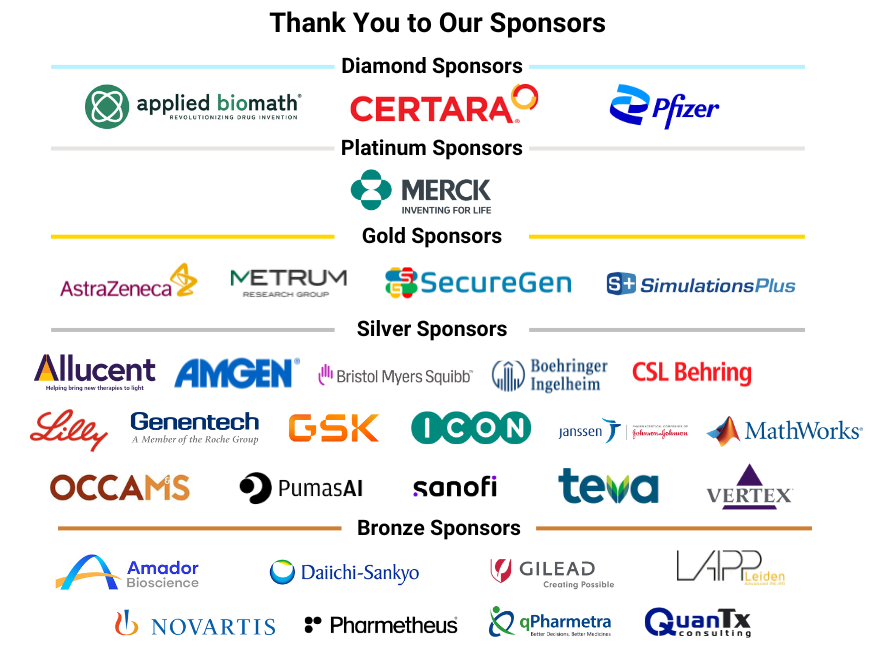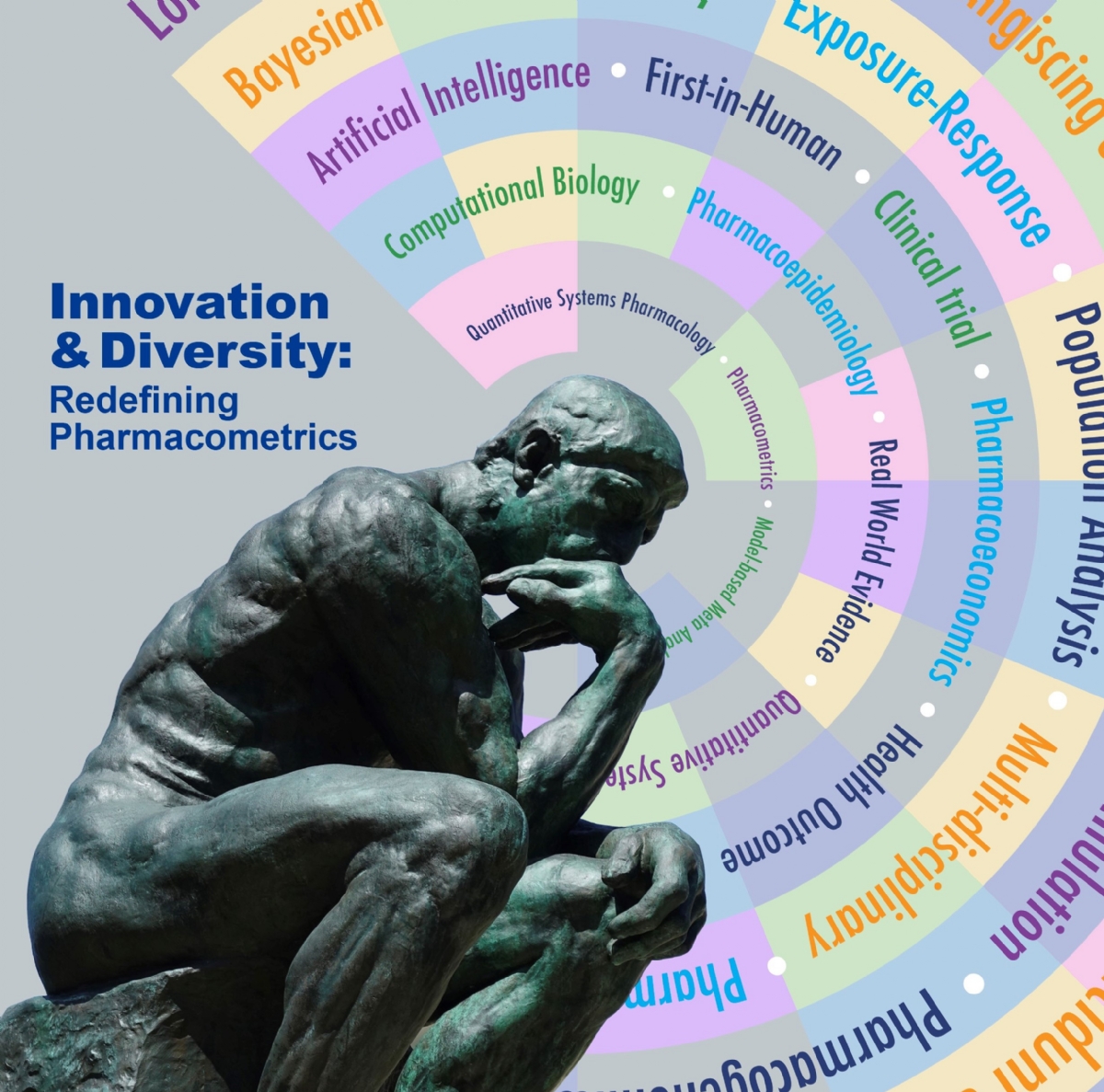Call for Late Breaking Abstract is Closed
View the information below to review abstract submission guidelines for ACoP14.
We are excited to inform you that the ACoP14 conference offers one last chance to showcase your groundbreaking research in pharmacometrics or related disciplines. We are now accepting late-breaking abstract submissions from August 7 until August 18, 2023.
The submission timelines are:
- August 7, 2023: Opening of the portal for abstract submissions.
- August 18, 2023: Closing of the portal for abstract submissions.
- September 1, 2023: Notifications of acceptance/rejection are sent out.
- September 8, 2023: Last day for acceptance of presentation at ACoP14.
The criteria for the late-breaking abstracts are:
- Original, significant, and ground-breaking research in pharmacometrics or related disciplines.
- Abstracts of original research submitted for publication in a peer-reviewed journal after or on May 15, 2023 (primary abstract submission deadline) are eligible.
- Encore abstracts (already presented at conferences as posters and/or oral presentations) are not eligible.
- Under a section “Late-breaking Justification”, describe in less than 100 words the reasons that make the submitted abstract be considered as late-breaking.
- Should indicate whether the abstract was previously submitted in a scientific proposal for presentation at ACoP or other conferences.
- Internal institutional clearance is required prior to submission.
- Late-breaking abstracts are not eligible for Awards.
- The guidelines on the format of the abstract are identical to the regular abstract submission and can be found here.
This is your final opportunity to share your work at ACoP14. Submit your late-breaking abstract and come join us in Maryland for this unique annual event on pharmacometrics!
Three Quality Abstract Awards and three Trainee Quality Abstract Awards will be selected from submitted abstracts, and the awardees will have the opportunity to orally present their works at the main conference. In addition to those, there are four awards from ISoP Special Interest Groups (SIGs). No separate abstract is needed for the four SIG awards and the winners will give short presentations during the official SIG gatherings at ACoP14.
• The Quantitative Systems Pharmacology (QSP) SIG of ISoP will provide one QSP SIG Student Award. Any current student who submits an abstract to ACoP14 is eligible for the award.
• The Statistics and Pharmacometrics (SxP) SIG of ISoP will provide one SxP SIG Trainee Award. Any current student or post-doc who submits an abstract to ACoP14 is eligible for the award.
• The Clinical Pharmacometrics SIG of ISoP will provide one Clinical Pharmacometrics SIG Trainee Award. Any current student or post-doc who submits an abstract to ACoP14 is eligible for the award.
• The Mathematical and Computational Sciences (MCS) SIG of ISoP will provide one MCS SIG Poster Award. Anyone who submits an abstract to ACoP14 is eligible for the award.
ACoP14 will offer SIG poster walks, which will be selected by the SIGs to recognize the thought-provoking accomplishments in the discipline.
Please reach out to us at abstracts@go-acop.org if you have any questions. Thank you in advance for supporting ACoP14!
Guideline and additional details for submitting your abstract are listed below:
Abstract Considerations
All submitted abstracts will be peer-reviewed. Abstracts will be reviewed based on:
• Relevance: Pharmacometrics has been defined as: “the science of interpreting and describing pharmacology in a quantitative fashion”, or “the science of developing and applying mathematical and statistical methods to characterize, understand and predict a drug’s pharmacokinetic, pharmacodynamic and biomarker-outcomes behavior” (Ette and Williams, 2007).
• Scientific content: Abstracts are expected to be scientific in nature and contain enough information to allow for scientific review. Abstracts without results will be rejected. (Are the methods described in sufficient detail? Does the abstract contain enough concrete evidence or results to support its conclusions? Are the results, either experimental or from computer simulation, quantitatively stated, either in table or graphical format? Alternatively, for abstracts describing a process, method or software, is the algorithm well described, has it been evaluated and are results presented? If the results are preliminary, are they characterized as such? Is the abstract purely or excessively commercial or promotional in nature?)
• Background: An appropriate level of background information should be provided to allow audience and reviewers to assess the scientific impact of the results or methodologies contained in the abstract (Is enough background provided for the reader to understand the abstract goal? Is the literature reviewed at least to some extent and in an unbiased manner? Are citations provided?)
• Innovation: Except for ENCORE presentations*, abstracts are expected to contain novel and significant information by some scientific criterion (Are the results methodologically innovative or otherwise significant? Do they shed light on certain aspects of pharmacotherapy for a particular disease? Is the methodology novel? If the methodology is not novel, is the application (to a particular problem or disease area) original? For an ENCORE submission, is the content particularly relevant to the discipline of pharmacometrics and the expected meeting audience?)
• Style: Abstracts should be concisely and clearly written, including structure, language, and overall exposition (Is the abstract main goal sufficiently clear? Are the results well summarized? Are there imprecision of language or errors of syntax and/or grammar? Are measurement units reported?)
*The conference may accept a limited number of selected ENCORE presentations. Their content should be particularly relevant to the discipline of pharmacometrics and the expected meeting audience. ENCORE submissions will not be eligible for the abstract awards. For ENCORE presentations, submitters should disclose the previous presentation in the body of the abstract and on the poster using the following suggested format: “The results in this abstract have been previously presented in part at [conference name, venue and date] and published in the conference proceedings as abstract [number]”. ENCORE abstracts without disclosure of the previous presentation will not be accepted. Submissions based on findings previously submitted solely in abstract form (e.g., as submitted to other conferences) that are not yet published and presented at the time of ACoP14 abstract submission do not qualify for submission.
Abstract Guidance
Authors must adhere to a standardized format to allow for publishing. The general format of abstracts follows that of most major scientific meetings, and is described below:
Title: Abstract Title
Authors: List of all Authors
Institutions: Affiliations for listed Authors
Objectives: A brief description of the objectives/hypothesis of the work described
Methods: A brief description of the methods used to reach the stated objectives, or to test the hypothesis
Results: A description of the results obtained
Conclusions: Conclusions that can be reached for the stated objectives and hypotheses.
Citations: Citations used to execute the work.
The maximum character count (not including spaces) for the abstract body is 2800, including Citations, but excluding Title, Authors, and Affiliations.
The abstracts are text only: no figures/tables are possible.
ACoP14 is using the same abstract submission portal as last year. Abstracts must be submitted online by clicking on “Submit your abstract here” at the top of the “Call for Abstracts” page. You must have an ISoP-registered account before you can submit an abstract, and creating an account is free. Please follow the instructions on the submission portal to complete all required information. You may submit more than one abstract. Once you submit the abstracts on the portal, you can continue to make edits to your abstracts until the submission deadline.
Abstracts that do not adhere to the guidelines, including word limit or format, will not be reviewed by the Abstract Committee, so please take the time to confirm your submission.
Questions regarding the ACoP14 Abstracts can be directed to the ACoP14 Abstracts Committee Chair, Bhargava Kandala (abstracts@go-acop.org).
PS - Copyright - The authors own and shall retain the copyright in all abstracts submitted and accepted for and presentations and posters presented at the ACoP meeting (beginning with the 2019 ACoP meeting) (such abstracts, presentations, and posters are collectively the “Material(s)”). In consideration of ISoP/ACoP evaluating the Material(s) for publication and/or permitting their presentation at ACoP, the Authors grant ISoP/ACoP a fully-paid up, irrevocable, permanent license to distribute, duplicate, publish, transmit, and/or record, in any and all media formats, the Material(s). ISoP/ACoP may publish the accepted abstracts on its website to allow the abstracts to be cited appropriately (ISSN – 2688-3953). In addition, electronic versions of posters will be posted and maintained on the ISoP/ACoP website library (beginning with posters submitted for the 2022 ACoP meeting). We request that the authors reference their work as mentioned on the site https://www.go-acop.org/poster-presentation-information. The copyright to abstracts accepted at ACoP meetings prior to 2019 and published in the Journal of Pharmacokinetics and Pharmacodynamics (JPKPD) supplement are property of JPKPD.


